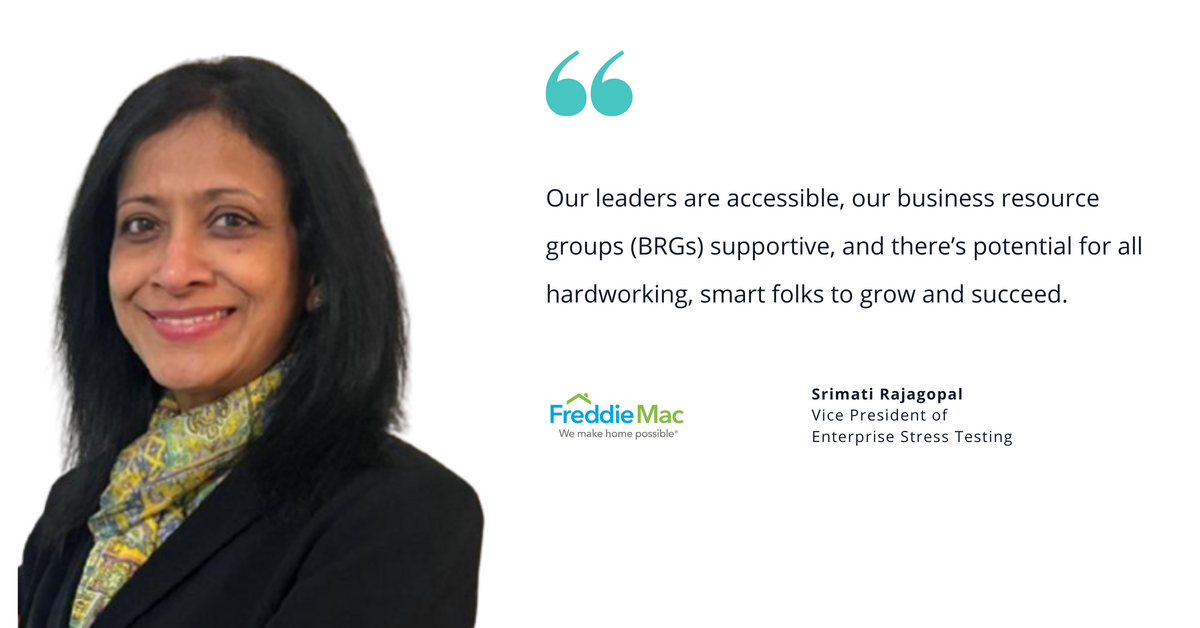Srimati Rajagopal has been with Freddie Mac, the Federal Home Loan Mortgage Corporation, for 17-plus years.
She has worked her way up to the role of vice president of enterprise stress testing and feels proud to have grown professionally within a company that values its people and promotes gender inclusivity.
“It's a lovely place to work. You feel that you are part of a bigger purpose, and you make home possible for one and all across diverse groups of people. And that gives you a sense of pride,” Srimati told us at our Empower Her: Advancing Women in the Workplace and Beyond summit.
“Our leaders are accessible, our Business Resource Groups (BRGs) are supportive and there’s potential for all hardworking, smart folks to grow and succeed. I’ve been blessed to work with some of the most wonderful people at Freddie Mac and they are some of the reasons why I'm still here.”
Still, Srimati is no stranger to the glass ceiling that women face in their careers, and, alongside her teammates at Freddie Mac, she advocates for the advancement of women in the workplace.
Following our conversation during Empower Her, we gathered the lessons learned from Srimati’s journey to becoming an executive at a Fortune 50 company — and how Freddie Mac is helping women succeed in the workplace.
Helping women “WIN”
One of Srimati’s many points of pride is her leadership role with Women’s Interactive Network (WIN), a voluntary, employee-led BRG at Freddie Mac. She is firm in her belief that with the support of the right allies and key mentors, anyone can grow in an organization.
"As chair, what I'm trying to do now is encourage other women looking to grow their careers. We have 1,600-plus members, and we pulse them regularly to find their needs. Then, we actually create programming to address those needs."
WIN brings together internal and external resources to create personal and professional support systems for women and allies at Freddie Mac. This includes running mentoring groups and coaching programs.
"We have events where our internal senior leaders talk about challenges they faced, like children-related anxieties, and how they addressed them while growing in their career,” Srimati said.
“It's important for women to hear that, ‘If she can do it, I can do it.’”
Beyond creating an inclusive and equitable workplace for different groups, BRGs also focus deeply on the company’s business goals. For instance, beyond Freddie Mac, Srimati said, “We're also trying to explore ways to weave women homeownership in general into this discussion. How do we make things easier for more women to go out and buy homes and have that confidence that they can do it?"
The power of self-advocacy
A study by Indeed found that 73% of women fear how they are perceived when self-advocating, which is a big concern with women at WIN, too. Srimati finds it troubling: “By self-advocating, you can ensure that people are inclusive of your own goals and needs as well. This is also part of the inclusivity equation.”
Under Srimati’s leadership, WIN will focus on self-advocacy for Women’s History Month and the rest of 2024, using panel discussions, coaching, and other conversations.
“We want our women to feel comfortable using their voices to promote their ideas, opinions, and values. And we are bringing leadership into this conversation as well, so it flows down to women at all levels, not just those at the top.”
The intersection of life and work
“When my daughter was born, 25 years ago, I quit my job to take care of her,” Srimati shared.
“Work-life balance is still a problem for many parents, and women specifically, because they feel this emotional obligation to do their best at everything.”
Srimati remarked that 25 years ago she didn’t have the support systems and the lack of progress was revelatory. “That was an eye-opener.”
“I hear this repeatedly from women leaders: They wish they had prioritized going to a child's concert instead of sitting in the office and working on something that was not truly a top priority.”
But she says progress has been made here and appreciates the offerings Freddie Mac has to help employees navigate the intersection of life and work. These include various leave options, such as backup, child and elder care, and caregiving leave, as well as 18 to 20 weeks of paid parental leave. In addition to flexible start times to the work day, Freddie Mac also offers four non-consecutive remote weeks that employees can use to spend time with family and friends.
Women need more than getting in the door
Srimati is witnessing the improvement in representation for women in the corporate world. More than 50% of Freddie Mac identifies as racially or ethnically diverse, and women make up 44% of the workforce. Many women like Srimati lead functions across departments, including legal, human resources, and internal audit.
“Freddie Mac provides all employees, including women, with the right resources, training, and mentorship to feel supported in their career and life goals,” she said.
“But we also recognize there’s a lot more to do. It’s not just about getting women in the door but also about keeping them. And that is where inclusion comes in. It’s about creating a culture where people feel able to be their best, most authentic selves.”
Throughout her career, Srimati has identified the importance of open communication in fostering an inclusive culture. And participating in BRGs is a great opportunity to address problems with leadership and help make significant change within an organization.
5 ways for women to supercharge their careers
Reflecting on the decades she spent growing her career, Srimati has some advice for early-career women:
- Build your A-team. “It's not about what you do or who you know. It’s who knows what you do that matters. So, network at all levels,” Srimati advised. This includes mentors, coaches, and sponsors. “We need to set aside time from our busy schedules and plan our networking meetings. Unless you're intentional, it's never going to happen. Focus on it."
- Challenge the norms. “We need to speak up for recognition, and not accept a system of bias when it comes to equity, promotions, progress, or even a seat at the table," Srimati insisted. “We must reshape certain societal and self-imposed gender norms and create better support systems. Support other women in building self-confidence and comfort with who they are."
- Advocate for yourself. “Keeping your head down and just doing your job is not enough. Be sure to self-advocate by sharing with leadership how your contributions advance business results. A lot of women do the work, but when it comes to asking for a seat at the table, we fall short."
- Bring everyone into the conversation. “I've heard managers say: ‘If I knew the issues women face at work, I think I’d be a better manager and support them better. But because I'm not part of those conversations and discussions, I don't know what I'm doing wrong,’” Srimati said.
- Accept your limitations. "The reality is that we cannot be everywhere and ace everything. We have to prioritize and live with it. And that's not easy. We need to get support and support other women, too, to be able to get there.”
To hear the full conversation with Srimati Rajagopal, you canwatch the summit recording here.
And if you’re interested in growing your career with a company that’s empowering women in the workplace, explore career opportunities with Freddie Mac here.




